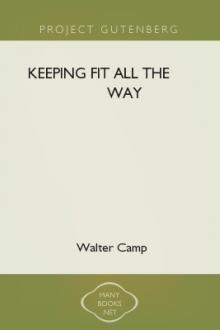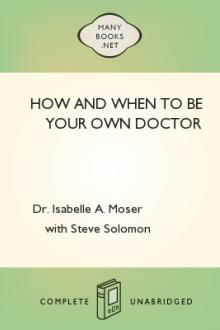Genre Health & Fitness. Page - 5

and calls in his physician. He does not pick up. Now, for the first time, he hears from the doctor words that he has caught occasionally about men far older than himself--"blood pressure." But he he is under fifty! The doctor says he must go slower. Now begins a dreary round indeed! He has never learned to go slow! He is an old man at fifty. If lucky, he has made money. But what is the price? He has found precious little fun in those fifteen or twenty years since he was a boy. Of course he has had his high living, his motor, his late hours. His cigars have been good, but he has never enjoyed them so much as he did the old pipe at camp. His dinners and late suppers can't compare with the fish and bacon of the woods.
What a fool he has been!
Perhaps he has caught himself in time. If so he is in luck and Nature may partially forgive him and give him a chance to "come back." He is well scared and he means to be good. But the scare wears off, and then, too, "business" presses him on again. And final

tant. Laugh a little, you know, and hold on to my arm."
Marilee's fingers were cold on Dikar's arm, but her laugh rippled like a little stream running over pebbles in its bed. They walked slowly away from the fire reached the shadowy edge of the woods, were closed around by the forest darkness.
"Now!" Dikar said, and he was flitting through the forest night, Marilee a silent shadow behind him. It was like her to stay close behind, like her to ask no questions as he ran through the woods to the cave again.
At the cave-mouth Dikar stopped a moment, sniffing the air. "Yes," he said, more to himself than to Marilee. "I can still smell the smoke of the fire-stick. The wet night air holds smells a long time." Then he was moving again, following the sharp tang of smoke in the air, following it away from the cave and away from the clearing.
The scent-trail led him downhill. Soon the laugh of a streamlet came to his ears and then Dikar pushed through tangling bushes and came out into starli

rewhat might perhaps be called the outside elements of life. Theseonce normally faced, cease to exist as impediments, dwindle away,and finally disappear altogether.
Thus we are enabled to get nearer the kernel, and have a growingrealization of life itself.
Civilization may give a man new freedom, a freedom beyond any powerof description or conception, except to those who achieve it, or itmay so bind him body and soul that in moments when he recognizes hisnervous contractions he would willingly sell his hope of immortalityto be a wild horse or tiger for the rest of his days.
These stones in the way are the result of a perversion ofcivilization, and the cause of much contraction and unnecessarysuffering.
There is the physical stone. If the health of the body were attendedto as a matter of course, as its cleanliness is attended to by thoseof us who are more civilized, how much easier life might be! Indeed,the various trippings on, and endeavors to encircle, this physicalstone, raise man

as present the greater part of the time.
* * * * *
From the foregoing, and from additional experiments, which it is not necessary to give in detail, it appeared, that when applied to a wound made in the most sensitive parts of the integuments, the oil of tobacco, though it caused a good deal of pain, had a far less general effect than when applied to the tongue. Rats were less affected than cats. Two and sometimes three drops rubbed upon the tongue of a rat, did not kill in half an hour.
Three large drops rubbed upon the tongue of a full-sized cat, usually caused death in from three to ten minutes, and in one instance, already stated, in two minutes and forty-five seconds. One drop passed into the jugular vein of a large dog, occasioned an immediate cry, followed in a few moments by staggering, convulsive twitchings of the voluntary muscles, and vomiting.
In those cases in which full vomiting occurred, evident relief fo

new civilization. Morning is still the most universal figure of progress, the type of a new life. More than all other natural occurrences it is used as a symbol of something higher.
May we not, accordingly, discover that from a psychological as well as a physiological point of view, for reasons of health and development, morning is the most significant and important time of the day!
No human being at the first moment of awakening is gloomy or angry. Everyone awakes in peace with all the world. It is a time of freedom. A moment later memory may bring to the mind some scene or picture that leads to good or bad thought, followed by emotion. This first moment of consciousness is the critical and golden moment of human life. How often has it been said to a child: "You must have gotten out of the wrong side of bed this morning."
Even animals and birds feel the significance of morning. Who has not, at early dawn, heard a robin or some other bird begin to sing--"at first alone," as Thomas Hardy

-Chancroids.
XXVI. THE CURABILITY OF VENEREAL DISEASE 174
Gonorrhea May Be Practically Cured in Every Case in Man--Extensive Gonorrheal Infection in Woman Difficult to Cure--Positive Cure in Syphilis Impossible to Guarantee.
XXVII. VENEREAL PROPHYLAXIS 177
Necessity for Douching Before and After Suspicious Intercourse--Formulæ for Douches--Precautions Against Non-venereal Sources of Infection--Syphilis Transmitted by Dentist's Instruments--Manicurists and Syphilis--Promiscuous Kissing a Source of Syphilitic Infection.
XXIII. ALCOHOL, SEX AND VENEREAL DISEASE 181
Alcoholic Indulgence and Venereal Disease--A Champagne Dinner and Syphilis--Percentage of Cases of Venereal Infection Due to Alcohol--Artificial Stimulation of Sex Instinct in Man and in Woman--Reckless Sexual Indulgence Due to Alcohol--Alcohol as an Aid to Seduction.
XXIX. MARRIAGE AND GONORRHEA 187
Decision of Physician Regarding Marriage of Patients Infected with Gonorrhea or Syphilis--A

em of medicine is unworthy of our confidence; that, with no law upon which to base its principles of treatment, its practice rests upon a chaotic mass of empirical experiences, groundless theories, and ever-changing fancies; that those best acquainted with its principles, and the results of its practice, have the least faith in its usefulness; and that the interests of the suffering, imperiously demand a revolution in the method of treating disease, and call for a system more in harmony with Nature, more reliable in its application, and more successful in its results.
This degraded state of the medical practice was deeply felt by HAHNEMANN, and in 1778 he retired from the practice of medicine in disgust at its uncertainties, after having acquired fame as a scientific scholar and high standing in his profession, breaking away from the past and opening a new field of glory to his activities, as well as a new era of progress in the medical art.
SAMUEL HAHNEMANN was a great man; the discoverer of th

hand,strengthens the will and increases strength of purpose as the pettyobstacles of mere self-love are removed. Concentration alone cannotlong remain wholesome, for it needs the light of growingself-knowledge to prevent its becoming self-centred. Yielding aloneis of no avail, for in itself it has no constructive power. But ifwe try to look at ourselves as we really are, we shall find greatstrength in yielding where only our small and private interests areconcerned, and concentrating upon living the broad principles ofrighteousness which must directly or indirectly affect all thosewith whom we come into contact.
I
The Freedom of Life
I AM so tired I must give up work," said a young woman with a verystrained and tearful face; and it seemed to her a desperate state,for she was dependent upon work for her bread and butter. If shegave up work she gave up bread and butter, and that meantstarvation. When she was asked why she did not keep at work andlearn to do it witho

native health care.
Naturally, my first stop was a local general practitioner/MD. Hegave me his usual half-hour get-acquainted checkout and opined thatthere almost certainly was nothing wrong with me. I suspect I hadthe good fortune to encounter an honest doctor, because he also saidif it were my wish he could send me around for numerous tests butmost likely these would not reveal anything either. More thanlikely, all that was wrong was that I was approaching 40; with theonset of middle age I would naturally have more aches and pains.'Take some aspirin and get used to it,' was his advice. 'It'll onlyget worse.'
Not satisfied with his dismal prognosis I asked an energetic old guyI knew named Paul, an '80-something homesteader who was renowned forhis organic garden and his good health. Paul referred me to hisdoctor, Isabelle Moser, who at that time was running the Great OaksSchool of Health, a residential and out-patient spa nearby atCreswell, Oregon.
Dr. Moser had very different methods

ime, it can be said that theindividual has started on the road of ill health. How fast he willtravel and just what will be the character of the disease he meetswith will depend upon his constitution, inheritance, environment andeducation.
APPENDICITIS
CHAPTER I.
This cut represents the back view of the cecum, the appendix, a partof the ascending colon, and the lower part of the ileum, with thearterial supply to these parts.
"A, ileo-colic artery; B and F, posterior cecal artery; C,appendicular artery; E, appendicular artery for free end; H, arteryfor basal end of appendix; 1, ascending or right colon; 2, externalsacculus of the cecum; 3, appendix; 6, ileum; D, arteries on thedorsal surface of the ileum."--Byron Robinson.
The reader will see how very much like a blind pouch the cecum is,2. The ileum, 6, opens into the cecum, all of the bowel below theopening being cecum, the opening of the appendix, 3, is in the lowerpart of the ce